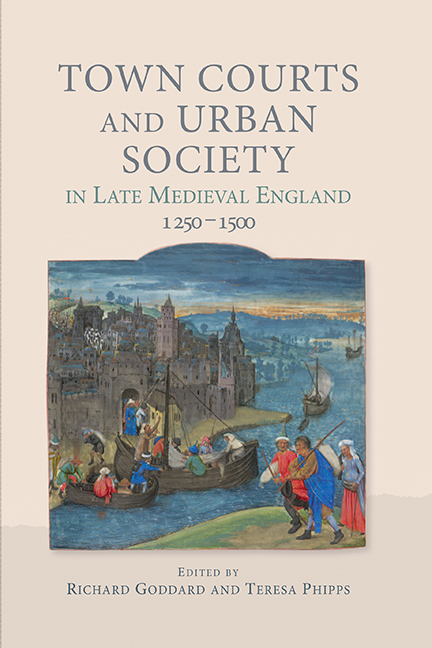Book contents
- Frontmatter
- CONTENTS
- List of Illustrations
- Contributors
- Acknowledgements
- List of Abbreviations
- Introduction
- Jane Laughton: In Memoriam
- 1 Town Courts in Medieval England: An Introduction
- 2 Borough Court Cases as Legal Precedent in English Town Custumals
- 3 The Priest of Nottingham and the Holy Household of Ousegate: Telling Tales in Court
- 4 Female Litigants and the Borough Court: Status and Strategy in the Case of Agnes Halum of Nottingham
- 5 Courts and Urbanisation: Jurisdiction in Late Medieval Seigneurial Boroughs and Towns
- 6 The Business of the Leet Courts in Medieval Norwich, 1288–1391
- 7 The Black Death and the Borough Court: The Changing Pattern of Social and Judicial Representation in Late Medieval Lincoln
- 8 Justice and Jurisdictions in Late Medieval Chester
- 9 Trust: Business Networks and the Borough Court
- 10 Society, Status and the Leet Court in Margery Kempe's Lynn
- Appendix: An Annotated List of Printed or Online Transcriptions and Translations of Medieval Town Courts in Britain to 1500
- Bibliography
- Index
2 - Borough Court Cases as Legal Precedent in English Town Custumals
Published online by Cambridge University Press: 14 September 2019
- Frontmatter
- CONTENTS
- List of Illustrations
- Contributors
- Acknowledgements
- List of Abbreviations
- Introduction
- Jane Laughton: In Memoriam
- 1 Town Courts in Medieval England: An Introduction
- 2 Borough Court Cases as Legal Precedent in English Town Custumals
- 3 The Priest of Nottingham and the Holy Household of Ousegate: Telling Tales in Court
- 4 Female Litigants and the Borough Court: Status and Strategy in the Case of Agnes Halum of Nottingham
- 5 Courts and Urbanisation: Jurisdiction in Late Medieval Seigneurial Boroughs and Towns
- 6 The Business of the Leet Courts in Medieval Norwich, 1288–1391
- 7 The Black Death and the Borough Court: The Changing Pattern of Social and Judicial Representation in Late Medieval Lincoln
- 8 Justice and Jurisdictions in Late Medieval Chester
- 9 Trust: Business Networks and the Borough Court
- 10 Society, Status and the Leet Court in Margery Kempe's Lynn
- Appendix: An Annotated List of Printed or Online Transcriptions and Translations of Medieval Town Courts in Britain to 1500
- Bibliography
- Index
Summary
Item, in the year of our Lord 1407, Robert Puttok, with others,
broke the heads of gutters, called clowses, at Figham and Swinemoor
and elsewhere, and he cast dirt from them. Therefore he
placed himself at the mercy of the keepers, with Thomas Whyte,
senior, as pledge, and put down 3s. 4d. because he was poor, and
16d. is returned to him as charity. And the penalty is imposed on
him that he should no longer trespass under penalty of 20s.
On the surface, the case of Robert Puttok may appear trivial, involving a penalty for property damage and nuisance, though such matters may have been particular concerns to civic officials entrusted with the maintenance of public health and sanitation, especially given the recurring outbreaks of plague, including one in 1407. The keepers (also called governors) of early-fifteenth- century Beverley found Puttok guilty but reduced his fine on account of his poverty, with a warning that recidivism would incur a penalty of twenty shillings. This case was considered worthy of note in one of Beverley's custumals, the Great Guild Book. When it became enshrined in a custumal – which typically included laws on trade, property, disorder, morality, the operation of borough courts and other matters that fell under the jurisdiction of town officials – it served as a legal precedent for how other such offenders in Beverley could be policed for incidents of nuisance. When court cases were singled out for inclusion in the record of a town's customary law, the borough court became more than a venue for the administration of justice; it also played a role in preserving, shaping and even creating the legal precedents that governed such administration. The town custumal reveals the rich world of prescriptive ideals that constituted borough customary law, which developed as towns grew larger and more autonomous over the central Middle Ages. Customs first appeared in royal and seigneurial charters in the twelfth century, but by the late thirteenth and early fourteenth centuries, officials began preserving their laws in stand-alone custumals and compilations, which could also include other types of customs such as ordinances, memoranda and extracts from charters. The very attributes that made these laws customary – for example, their appeals to antiquity or claims of their supposed origins in the eras of long-dead kings – also lent them their legitimacy.
- Type
- Chapter
- Information
- Publisher: Boydell & BrewerPrint publication year: 2019



